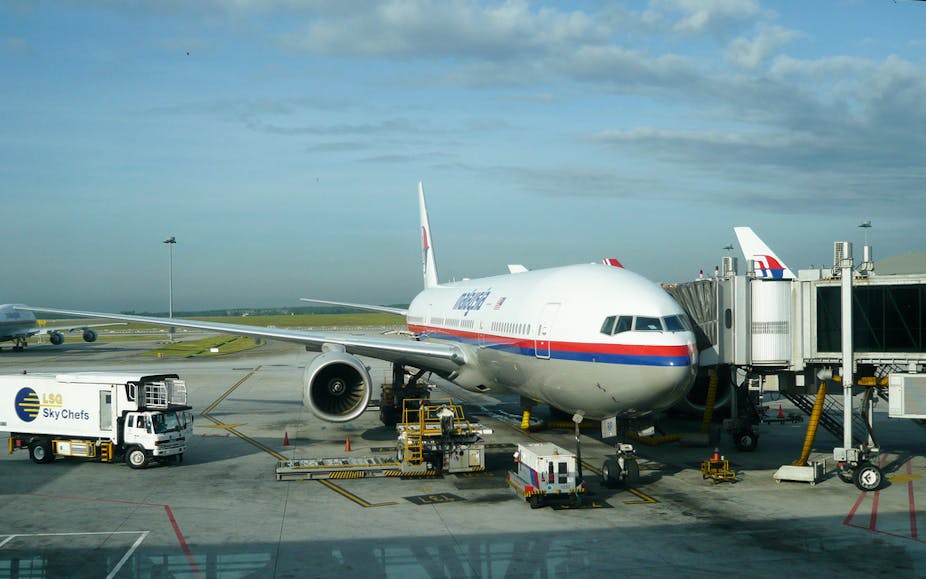Even as we learn more about the disappearance of flight MH370, there is still a huge amount to find out about what went wrong.
There is no evidence to suggest that the cause of the airplane’s disappearance had anything to do with operational oversight or management mishap on the part of Malaysia’s national flag carrier, Malaysia Airlines. The crisis appears to be caused by forces beyond the control of any airline’s management team.
But their subsequent handling of the crisis has been far from competent. There are structural reasons for this: it turns out the airline’s close relationship with the Malaysian government, so useful in the past, may have actually hindered its efforts to put customers first and deliver the best response to the disappearance of MH370.
The airline’s response has been characterised by a lack of prompt and detailed information sharing with the media and relatives of missing passengers, defensive PR posturing, and not displaying a sense of urgency or a clear process for effective crisis management.
This managerial ineptitude has gone from bad to worse, accentuated by heavy-handed security measures when dealing with the relatives of the disappeared. What commercial enterprise dispatches security staff to physically prevent the protesting relatives of missing customers from speaking to international journalists? Clearly not one paying head to the Chinese proverb, “a crisis is an opportunity riding the dangerous wind”.
The opportunity here is to show the watching world that in the face of unexplained calamity, Malaysia Airlines is a company that cares for its customers more than anything else and will stop at nothing to ensure their wellbeing – or at least to provide closure to their loved ones.
Here’s how it’s done
Trust and reliability are at the heart of most relationships between customer and business. When things go wrong, companies must confront them unequivocally, act immediately and deliver decisive solutions.
This is what Johnson & Johnson, the pharmaceutical and consumer products corporation, did in a classic case of good crisis management. A handful of its best selling painkillers Tylenol had been laced with cyanide, resulting in the deaths of seven people. Johnson & Johnson placed consumers first, immediately recalling 31m bottles of Tylenol and replacing them with safer, more securely packaged products.
Despite an initial drop in market value of $1 billion and losing 30% of its share of the painkiller market, predictions that the company would never recover from the crisis proved unfounded. It had done the right thing and acted without hesitation or equivocation to put customer safety ahead of corporate interest. People recognised this and within a short space of time, market value picked up and sales rebounded. But if handled differently, the Tylenol crisis could have destroyed the company.
The lessons for Malaysia Airlines are clear. If attitudes and actions are not altered at once, its future may be fraught with further challenges and commercial crises.
Despite recent restructuring and financial pressures, this is an airline with a long history (founded in 1937) and a reputation for quality service and high levels of safety. However its corporate strategy is complicated – even restrained – by the interests and priorities of key stakeholders, most notably in this instance, its main shareholder, the government of Malaysia.
This isn’t usually a problem. In most instances, companies benefit from preferential access to government and regulatory bodies. A strategy that synchronises making money with political and regulatory activism and social and environmental engagement is best for any company. Done properly, it can ensure that senior management successfully deliver on a company’s overarching purpose and business objectives.
But when the interests of the company, and the customers it serves, become diluted or even subjugated by other interests – personal, societal or political – competitive strategy is undermined. That appears to be the case here; the airline has in fact suffered from its close links to government.
Why, for instance, since the disappearance of MH370, do we hear more from Malaysia’s prime minister and transport minister than we do from the CEO of Malaysia Airlines?
This crisis is not about saving face for the government of Malaysia, navigating tense inter-state relations (particularly with the emerging Chinese superpower), or tiptoeing through a geopolitical minefield. It is first and foremost about finding out what happened to Malaysia Airlines’ missing passengers.
Subsequently, it is about restoring market and customer confidence in a company that employs more than 20,000 people and is integral to Malaysia’s economy. The rest is just noise.

